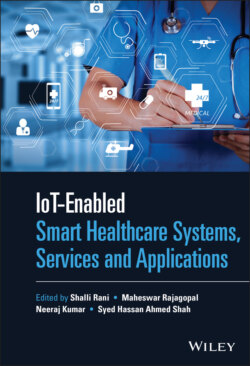Читать книгу IoT-enabled Smart Healthcare Systems, Services and Applications - Группа авторов - Страница 16
1.2.1 Artificial Intelligence (AI) in Healthcare
ОглавлениеAI holds great sovereignty in the field of computer technology and is spreading its autonomy among many sectors of the world. One of the main sectors influenced by AI is healthcare as it digitizes human life at a vast level from the life of a single individual to several people’s lives. AI is having a great impact on economical, societal, and industrial domains through healthcare and medicine. Some of the roles we define in this chapter such as AI can anticipate the current heart rate of an individual using big data machine learning and expert systems. Another benefit anticipated is that it has made medical care less costly and more available. AI has made it simple for doctors, nurses, and hospital staff to do complex jobs in a very short time and in an efficient manner.
Going through the important medical questions, AI techniques can compile healthcare information from big data sources, which helps in proper decision‐making converting these several pen‐and‐paper‐based processes into a digitized form to make computer software more intelligent and autonomous. AI and machine learning are accelerating the cadence of healthcare very quickly. AI aims to recast the medical industry and bring about certain strategies that were unattainable in real scenarios. AI helps analyze and identify patterns in ambiguous datasets more quickly and efficiently. On the other hand, machine learning makes use of learning algorithms to extract attributes from the incoming data (input data is the patients’ attributes such as gender, medical history, genetic expression, age, analytical imaging, and symptoms). The OECD AI Principles are the first such principles signed up to by governments. Beyond OECD members, other countries including Argentina, Brazil, Costa Rica, Malta, Peru, Romania, and Ukraine have already adhered to the AI Principles, with further adherents welcomed.
The role of AI is to make computers more beneficial in overcoming healthcare challenges. Various chronic diseases such as diabetes, Alzheimer’s, several types of cancers including colon and breast cancer, and cardiovascular diseases are diagnosed early just due to AI.
The recommendation indicates five complementary values‐based principles for the responsible management of trustworthy AI:
AI increases inclusive growth, sustainable development, and well‐being.
AI systems are configured in a way that allows them to act as appropriate safeguards—for example, enabling human intervention where necessary—to ensure smart home gadgets for better living.
There should be responsible disclosure around AI systems to ensure that people understand AI‐based outcomes and can challenge them.
AI systems must function in a robust, secure, and safe way throughout their life cycles, and potential risks should be continually assessed and managed.
Organizations and individuals developing, deploying, or operating AI systems should be held accountable for their proper functioning in line with the above principles [12]. We could not imagine our world now without AI.
